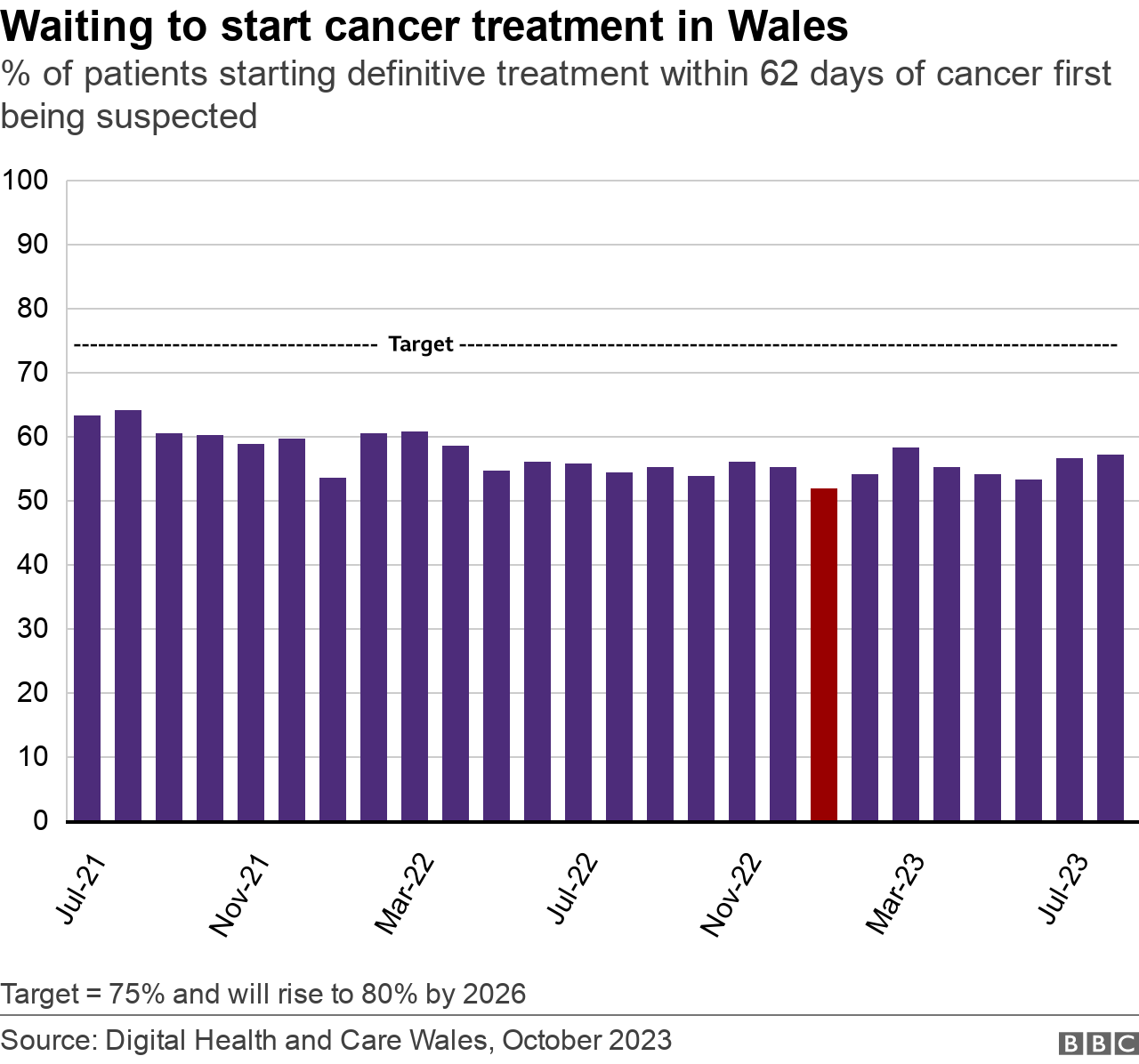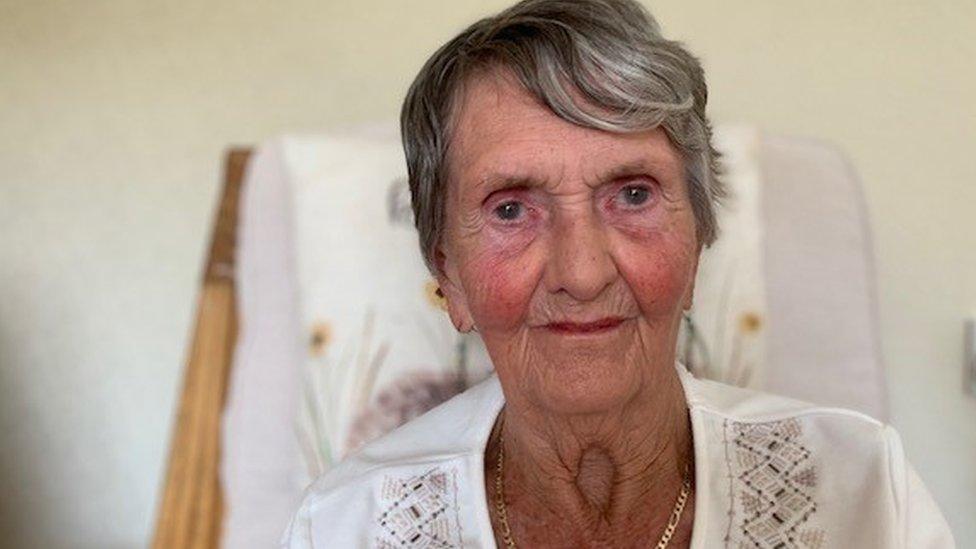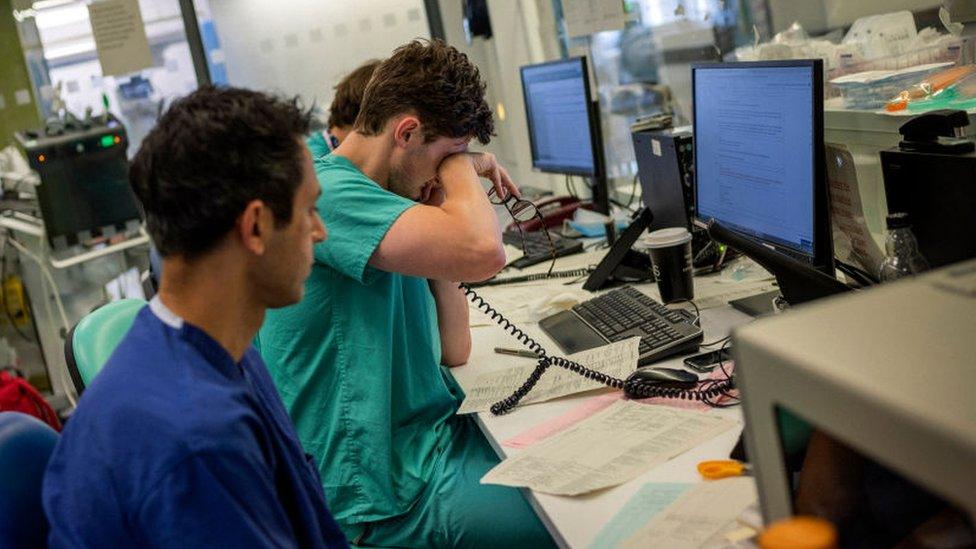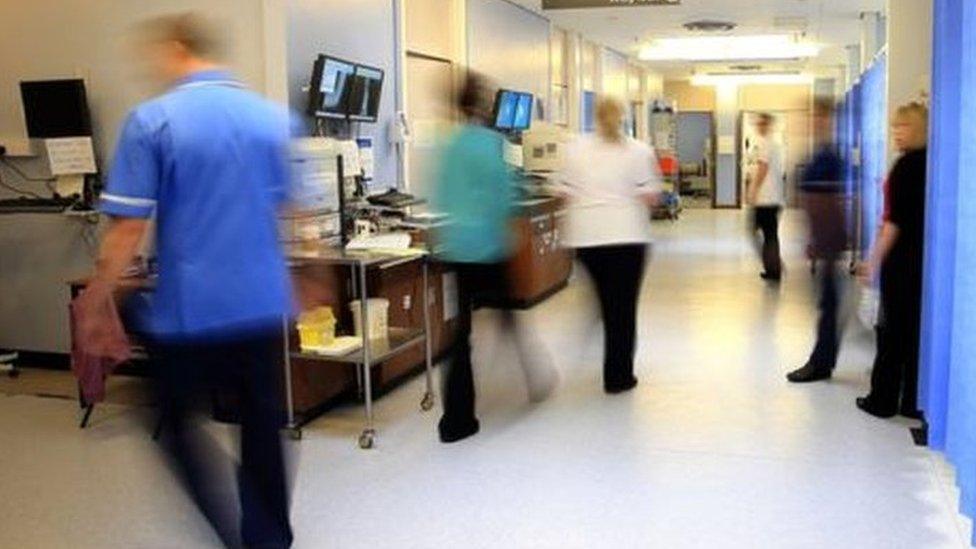NHS Wales waiting lists highest on record
- Published

There are 593,000 actual patients estimated to be on the waiting list
Hospital waiting lists have hit a new record in Wales, according to figures.
There were 760,282 patient pathways on the list for treatment, with one in five waiting more than a year, the latest data has shown.
Wales' health minister Eluned Morgan said the figures were "disappointing", while the BMA said the NHS faced an "existential crisis".
Ambulance responses to life-threatening calls worsened, although there was an improvement in cancer waiting times.
The latest Digital Health and Care Wales figures reflect the scale of NHS pressures just two days after the Welsh government announced that £425m extra would be spent on health and social care this year.
Even with that cash injection, Finance Minister Rebecca Evans insisted health boards would still need to make "extremely difficult decisions this year and the next".
First Minister Mark Drakeford also indicated the funding would just be enough "keep things going" during a "crisis".
Ms Morgan told BBC Wales it was going to be a "very tough winter".
"It is going to be pressurised, there's no question about that and of course, we're doing that at a time of significant financial constraints as well.
"We're spending a lot of time discussing with our local government colleagues to make sure that we can improve the flow through our hospitals trying to put more support into our communities to stop people from coming into hospitals."

What do the latest figures show?
The 760,282 patient pathways - the route to treatment after referral for a particular condition - is the highest on record.
Because some patients are on more than one waiting list for different conditions, it is estimated there are 593,000 actual patients on the list.
When we look at consultant-led specialisms - so we can compare with England - there are 133,180 waiting more than a year.

This is an increase for the second successive month after seven months of falls. It involves 19.8% of patients on the list but this compares with 5.1% on the list waiting more than a year in England.
In accident and emergency, there was an improvement over the month. In major A&E units, 59.5% of people spent less than four hours in the department.
This is slightly better than the position in England.
There were 9,656 patients who spent 12 hours or more waiting in A&E, a slight improvement on the previous month - but the target is that no-one should wait that long.

In recent days, the A&E figures in Wales have been challenged by senior doctors, but the Welsh government said "once again" the numbers include so-called clinical exceptions.
Its chief statistician Stephanie Howarth said: "Following the concerns raised, local health boards have provided assurance this week that the data they submit to Digital Health and Care Wales is in line with the guidance on reporting clinical exceptions."
There was a worsening performance for the ambulance service, with 48.7% of "red" calls getting an emergency response within eight minutes. This was 1.7% lower than in August and the lowest since March.
Handover delays outside A&E continue to fall, although there were still more than 13,000 hours spent by ambulances beyond the 15-minute target window, waiting to release patients.
Figures also show there are nearly 1,600 patients who are ready to be discharged but are taking up a hospital bed because of a delayed transfer of care.
This is the equivalent of all the beds at the University Hospital of Wales and Llandough Hospital in Cardiff and Vale.

Cancer waiting times showed an improvement, with 57.3% starting treatment within 62 days of cancer being suspected - but this is still below target.
The number waiting more than a year for a first outpatient appointment has risen by more than 1,700 since the previous month to more than 52,600.
This was supposed to have been eradicated by the end of 2022.

June had a long wait in A&E at the start of October
June, 89, had a series of falls at her home in Rhos on Sea, Conwy, and after an hour and a half wait inside an ambulance outside A&E, then faced a "horrendous" wait of more than 30 hours at Glan Clwyd hospital - from Monday morning until Tuesday afternoon.
"I was tired and uncomfortable, going a bit numb and getting cramp," she said.
"You're just wondering when it's going to end. You're not given any idea when, how long you are going to sit there at all."
Her daughter Sue said: "The staff were brilliant. But there's nothing they can do, they just don't have the resources, they just don't have the chairs, the beds, enough staff and like I said the washing facilities aren't up to what they should be."
The health board has offered its apologies and said the emergency unit had been experiencing significant demand, resulting in much longer waiting times than they would like.
What has been the response?
Health Minister Ms Morgan said: "It is disappointing to see overall waiting lists rise again, but I have been clear with health boards that I expect to see improvement in this area, and we will continue to support them to achieve that.
"It is crucial that we develop solutions that will create an NHS that is fit for the future, despite the financial challenges that we are up against."
The Conservatives said progress on the two-year treatment time waits had been "at a snail's pace".
"At this rate it will take another two-and-a-half years to eliminate them," said health spokesman Russell George.
Plaid Cymru's health spokesman Mabon ap Gwynfor said the figures showed an "increased pressure on our emergency departments, and more patients being added to waiting lists than can be cleared."
He said with the backdrop of financial worry, health boards needed a firm footing in order to plan ahead.
The NHS Confederation, which represents health boards, said "concerted efforts to tackle the longest waiters are paying off" although it warned of difficult decisions in the coming months.

Enter a postcode to find out what is happening in your area with A&E, ambulances and hospital waiting lists across the UK.

MYFANWY HAYCOCK: Jenni is on a mission to revive the legacy
ALL THINGS CONSIDERED: Oppenheimer and the Bomb

Related topics
- Published18 October 2023

- Published21 September 2023

- Published24 August 2023

- Published20 July 2023

